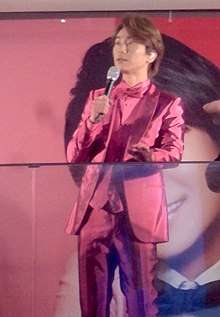Kiyoshi Hikawa
Kiyoshi Yamada, whose stage name is Kiyoshi Hikawa (氷川 きよし, Hikawa Kiyoshi), is a Japanese enka singer.[1] Hikawa makes frequent appearances on NHK Kayō Concert (NHK歌謡コンサート), as well as NHK's annual Kōhaku Uta Gassen.
Kiyoshi Hikawa 氷川 きよし | |
|---|---|
 Performing in Shimbashi, 2018 | |
| Background information | |
| Birth name | Kiyoshi Yamada (山田 清志) |
| Born | September 6, 1977 Fukuoka, Japan |
| Genres | Enka, Kayōkyoku, Pop |
| Occupation(s) | Singer |
| Years active | 2000–present |
| Labels | Columbia Music Entertainment (2000–present) |
| Website | columbia |
History
Hikawa was born on September 6, 1977 in Minami-ku, Fukuoka, Japan.[1] As a high school student, Hikawa was a member of the school's performing arts club (芸能部, geinō-bu) and trained to be a singer after graduation from high school in 1995, Hikawa travelled to Tokyo, where he became an apprentice under the supervision of Hideo Mizumori. He served under Mizumori for three years.
In 2000, Hikawa made his professional debut with his single "Hakone Hachiri no Hanjirō."[2]
Hikawa released the single "Hatsukoi Ressha" on February 9, 2005. It became his first number-one single on the Japanese Oricon weekly single charts. In 2006, he won the grand prix award by his song "Ikken" at the 48th Japan Record Awards. On February 4, 2009, he released single "Rōkyōku Ichidai", which became his second number-one single on the Oricon weekly charts. On May 20, 2009, he released album Enka Meikyoku Collection 10: Rōkyōku Ichidai, which debuted at No. 2 on the Oricon weekly album charts only behind Eminem's album Relapse. He released his second single of the year, "Tokimeki no Rumba", on August 19, 2009. The single debuted at No. 1 on the Oricon weekly charts with the first week sales of about 68,000 copies, making him the first solo enka singer to make three number-one singles in Oricon history.[3] He released album Enka Meikyoku Collection 11: Tokimeki no Rumba on November 11, 2009.
At Jump Festa 2017, it was announced that Hikawa would sing his first anime theme song, which was Dragon Ball Super's second opening theme, "Genkai Toppa x Survivor". It was composed by Takafumi Iwasaki and the lyrics were written by Yukinojo Mori.[4][5]
Discography
- Enka Meikyoku Collection Ōi Okkake Otojirō: Seishunhen (2001)
- Enka Meikyoku Collection 2: Kiyoshi no Zundoko Bushi (2002)
- Ginga: Hoshizora no Akiko (2002)
- Enka Meikyoku Collection 3: Hakkun no Shiro (2003)
- Otokogi (2003)
- Enka Meikyoku Collection 4 Banba no Chūtarō (2004)
- Enka Meikyoku Collection 5 Hatsukoi Ressha (2005)
- Enka Jūniban Shōbu!: Omokoge no Miyako (2005)
- Enka Meikyoku Collection 6: Ikken (2006)
- Enka Meikyoku Collection 7: Abayo, Kiyoshi no Sōran Bushi (2007)
- Enka Meikyoku Collection 8: Genkai Funauta (2008)
- Enka Meikyoku Collection 9: Aishū no Mizuumi (2008)
- Enka Meikyoku Collection 10: Rōkyōku Ichidai (2009)
- Enka Meikyoku Collection 11: Tokimeki no Rumba (2009)
- Enka Meikyoku Collection 12: Shamisen Tabigarasu (2010)
- Enka Meikyoku Collection 13: Niji-iro no Bayon (2010)
- Enka Meikyoku Collection 14: Ano ko to Nogiku to Watashi Bune (2011)
- Enka Meikyoku Collection 15: Jōnetsu no Mariachi (2011)
- Enka Meikyoku Collection 16: Sakura (2012)
- Enka Meikyoku Collection 17: Saigo to Kimeta Hito Dakara (2012)
- Enka Meikyoku Collection 18: Shigure no Minato (2013)
- Enka Meikyoku Collection 19: Manten no Hitomi (2013)
- Hikawa Kiyoshi Shōwa no Enka Meikyokushū (2014)
- Enka Meikyoku Collection 20: Choi to Kimagure Wataridori (2014)
- Shin Enka Meikyoku Collection: Sasurai Bojō (2015)
- Shin Enka Meikyoku Collection 2: Itoshi no Te Quiero/Otokobana (2015)
- Shin Enka Meikyoku Collection 3: Miren Gokoro (2016)
- Shin Enka Meikyoku Collection 4: Kiyoshi no Nippon Zenkoku Utano Wataridori (2016)
- Shin Enka Meikyoku Collection 5: Otoko no Zekka (2017)
- Shin Enka Meikyoku Collection 6: Aoshi (2017)
- Shin Enka Meikyoku Collection 7: Shōbu no Hanamichi (2018)
- Shin Enka Meikyoku Collection 8: Fuyu no Pegasus Shōbu no Hanamichi: Orchestra (2018)
- Shin Enka Meikyoku Collection 9: Daijōbu/Mogami no Sendō (2019)
- Shin Enka Meikyoku Collection 10: Ryūshō Hōbu (2019)
- Papillon -Bohemian Rhapsody- (2020)
References
- Hikawa Kiyoshi: Profile. (in Japanese) Columbia Music Entertainment. Accessed May 6, 2008.
- Hikawa Kiyoshi – Oricon Style Music. (in Japanese) Oricon, Inc. Accessed May 6, 2008.
- 氷川きよし3冠達成! 演歌ソロ史上初3作目の首位獲得に「奇跡です」 (in Japanese). Oricon. August 25, 2009. Retrieved November 12, 2009.
- "Gods And Heroes Of 'Dragon Ball Super – Universal Survival Arc' Gathered For New Opening Preview Shots". Crunchyroll. February 4, 2017. Retrieved August 12, 2018.
- "Dragon Ball Super's New Opening Sequence Previewed in Screenshots". Anime News Network. February 4, 2017. Retrieved August 12, 2018.
External links

- Official website (in Japanese)
| Preceded by Amika Hattan |
Japan Record Award for Best New Artist 2000 |
Succeeded by w-inds. |